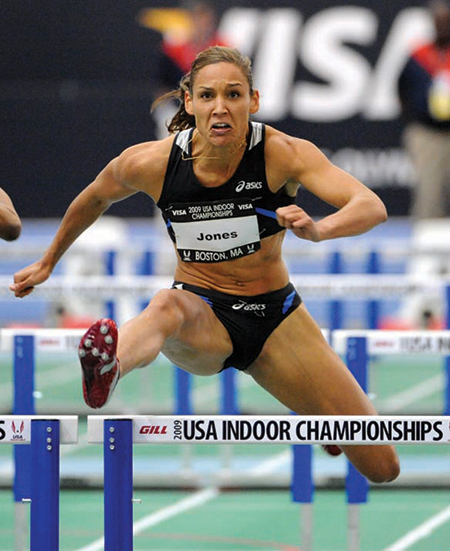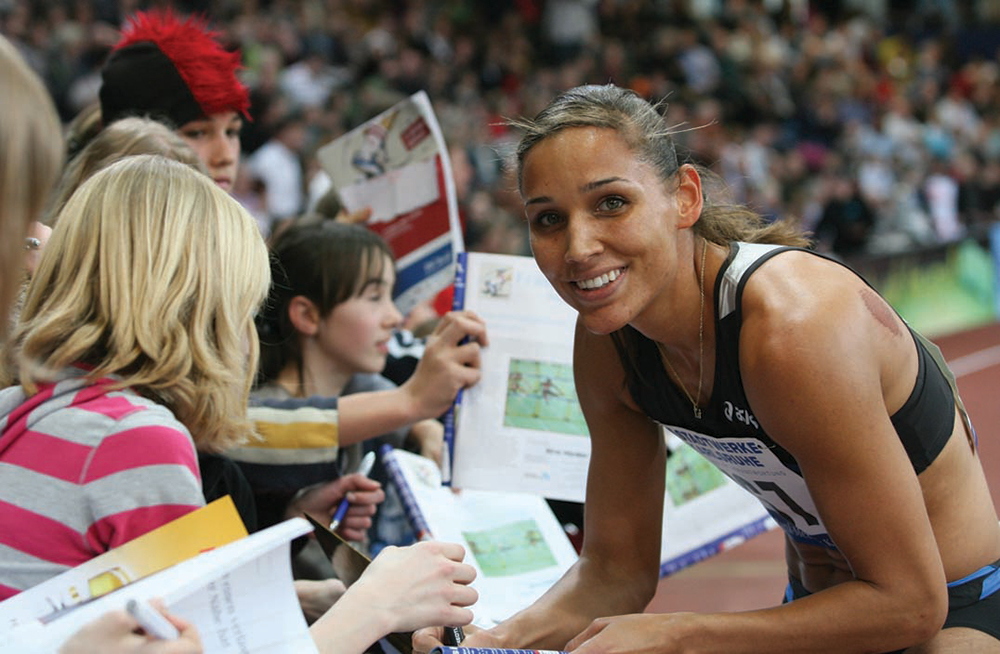
FOR OUR MAY 2009 issue, Sieg Lindstrom interviewed 100 hurdles star Lolo Jones. Subsequent to their chat, Jones went on to repeat as indoor 60 hurdles world champion in 2010, place 4th in the ’12 Olympics 100H in London and earn 5 more World Rankings spots through 2014, in which year she competed in the Winter Olympics as a bobsled brakewoman.
With meets to report on during the current COVID-19 competition lockdown scarce for the moment, we’ll be rebooting more content from years past. Our full T&FN Interview Archive, with most of the offerings in PDF form, may be found here.
Lolo Jones is ready for ’09, even with a public- appearance schedule that has ballooned befitting her No. 1 World Ranking in the 100 hurdles in ’08, her heartrending fall while leading the Olympic final, and charity contributions that have made her a famous favorite daughter in her native Iowa. Even for fans who follow track just once in four years, Jones’s Beijing stumble aroused great empathy. Who hasn’t tripped, at least metaphorically, at just the wrong moment?
Jones dusted herself off and hurdled ahead, as she has ever since 10th-grade, when she parted with her mother to live with friends and pursue her track dream.
Faced later in her prep days with a choice between an Iowa State science scholarship or a gamble on getting a track grant, Jones chose her sport and eventually LSU’s offer of athletic aid.
Of her recently ramped-up sponsor- and charity jaunts, she admits, “I was nervous because I was trying to get workouts done in random places”—including a “stadium” workout in the stairwell of a Des Moines parking garage.
But Jones dominated the indoor hurdles and feels “like I didn’t even skip a beat.” (Continued below)
T&FN interviewed the popular Jones upon her return from a training “mini-vacation” to Hawai‘i in March.
T&FN: Hawai‘i, huh? Did you get a chance to lie on the beach and relax at all?
Jones: I did but people were joking—it was a group of us—because I actually got a better tan when I went to work out at the track than when I was laying out by the beach [laughs].
T&FN: You dominated this winter. You must be pleased with the groove your technique is in.
Jones: Well, right now I’m taking a break from hurdling because indoor season does put a toll on your legs. I did come back a little bruised and beat-up so we’re resting from hurdling. But the technique is definitely strong, the rhythm is there.
What I felt was different from indoors was last year I had Susanna [Kallur]. She was breaking the World Record and she was running incredibly fast. So I had her to kind of push me along and pull me into that fast time that I had last year.
But this year I was the one running fast. She’s injured and other people weren’t running indoors as intensely as they usually do. So it was me pushing myself and I was surprised I was able to maintain, to still be in the vicinity of what my PB is.
T&FN: You obviously love this sport. How was it that you had to choose between living with your family and track?
Jones: My mom wanted to move to a smaller town and at that time they didn’t have a track. I would have had to give up my plans in track & field. For me personally, track & field was just my way to get out of poverty. I knew I could get a scholarship for track & field. I knew I enjoyed it but I don’t think I learned my passion for track & field until actually when I didn’t make my first Olympic team.
In college I had great years. We won national championships; I won an individual title. That was great. But it’s all said and done when you have your way out of poverty. I had my college degree. I could have easily gotten a job getting a salary. Instead I chose track & field and I wasn’t getting paid.
I didn’t have a contract and I had to work two part-time jobs. And it was in those workouts [at that time] that I realized I really enjoy running and I will continue it; even if I’m not a professional athlete, I’m always going to find some kind of venue that I can run in.
Just like the other day when I was in Hawai‘i. Most people were on the beach, volleyball, wakeboarding, whatever. I went to do this workout. It was a very hard workout.
I want to say it was a 300-250-200-150, all the way down; like six efforts. I did this by myself and each one was getting faster. I did this workout and there’s just a peace and a serenity that comes over you when you’re hitting your times how you’re supposed to be hitting them. There’s just a zone you get in and just the elation when I finished the workout.
I mean, I couldn’t have been happier if I was just laying on a beach with a drink in my hand or if I was surfing. I was so happy.
T&FN: What was it like to decide to part from your family at such a young age?
Jones: I was a sophomore and I remember that my mom didn’t know the exact date when she was going to move. I had to go to a competition for the Junior Olympics and I didn’t know if I’d run into her at our place when I came back. I came back and at our townhouse the door was open but nobody was home; everything was cleared out. So I was like, “Oh, I guess I’m going with the other family now.” It was one of the strangest stories; it was crazy. But it was cool, though.
T&FN: Were you already thinking at that time of track as your ticket to a better life?
Jones: I was thinking, “Track will get me a scholarship. If I do everything to keep that scholarship, I’ll get a degree. If I get a degree I’ll get a good-paying job.” I just knew that step-by-step, track could get me somewhere where no one in my family had ever been. (Continued below)
T&FN: That’s a very mature outlook for a 10th-grader.
Jones: I don’t know why. I mean I read a lot of books. I was known as a nerdy kid. I guess because I had three siblings before me not go to college I was just, “I want to go to college. I want to see what college is like.”
T&FN: After the Olympic Trials you donated your prize money to victims of the Iowa floods. How did you decide to give back in that way?
Jones: Well, the flooding happened at the same time as the Olympic Trials. Every athlete at a major competition, all of us, we all do this, we just sit in our rooms and watch non-stop TV. Because you don’t want to walk around, you don’t want your legs to be tired. You’ll go to practice but you’ll just sit in your room a lot of the time. All I kept watching on CNN and Fox was this devastation of Iowans. I was like, “This is my family; this is my friends.”
I couldn’t do anything about it, but the moment I won—and that was the happiest I have ever been in my life—I knew I was going to donate my prize money.
And what was crazy for me is that I think the prize money was like $4000, but the $4000 kept turning in to more and more money because Asics matched it, then Oakley matched it, and then at the Olympics, EOS Shaving Cream depending on what time I ran matched it even more. So it turned into this crazy amount of money. It was either $18- or $21,000. My little amount of money just snowballed.
T&FN: I have a friend whose daughter turned 2 just after the Olympics. Her parents watched the Olympics on TV, and one race made a profound impression on her: the women’s 100 hurdles. After your race she was “Lolo Jones” for weeks afterwards. She ran imaginary races around the house as “Lolo,” and sometimes she’d win, sometimes she’d stumble and fall on the kitchen floor.
Jones: Oh, that is so cool. I don’t know; my name is easy. Maybe that’s why kids like me.
T&FN: I think your Beijing experience was something anyone could relate to, as painful as it had to be for you.
Jones: Yeah, and actually I have already learned how to embrace it because people want to talk about it. They want to know what happened. At first I had no issues. It was OK, cool, I can talk about it. Then it was like everywhere I went. It was kind of too much because the sore was still open. People wanted to talk about it. The sore was trying to heal and they ripped my scab off every time.
But now it’s at a point where it’s a permanent scar and I’m used to looking at it. It’s come to a point where I’ll remember Beijing by that scar and I’m kind of happy that I have that scar.
I knew I was past it when I went to the USA Indoor; I’m walking to the final of the 60-meter hurdles and one of the officials said, “I felt so bad for you, what happened at the Olympics. “I was like, “Oh, really? This is the worst time ever to tell me this.” But I just had to laugh, and then I went on the track and I did exactly what I needed to do to win the Visa Championship.

I was on the track and he was holding onto my arm. I was trying to get away from him, but I just was glad that he did that because it showed that I’ve been through it so many times now with people that I kind of embrace it.
T&FN: What are you excited about for this year?
Jones: I’m super-pumped because I really think that the World Championships winning time is going to be faster than the Olympic finals was.
I remember Susanna Kallur ran 12.40-something in the Osaka final and did not get a medal. I think a lot of people are going to be back that weren’t in the picture. I’m sure Michelle Perry, Ginnie Powell, Susanna will be healthy. Josephine Onyia, who didn’t make the final.
There’s a lot of people who were out of the picture for the Olympics that I think are going to be back, and they’re going to be like, “Look, OK, maybe I didn’t go to the Olympics or didn’t medal, but hey, I’m still one of the best hurdlers in the world and I’m going to show you at the World Championships in Germany.”
I think it’s going to be an exciting race and I’m just curious to see how I fare in all of it. ◻︎